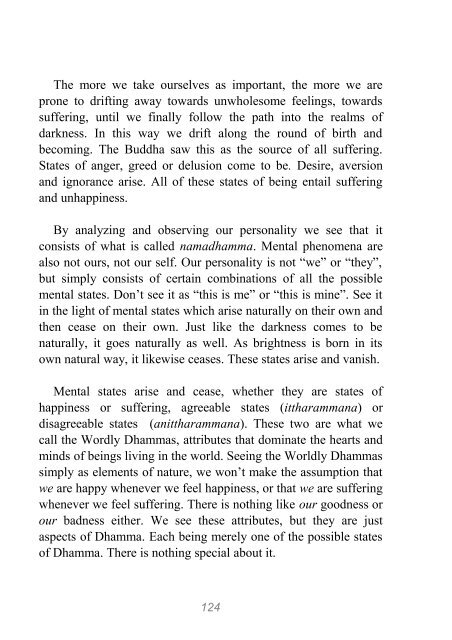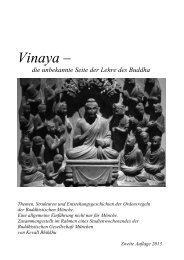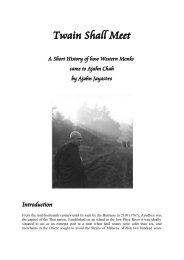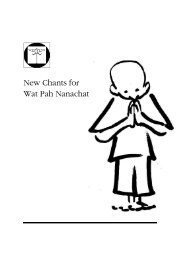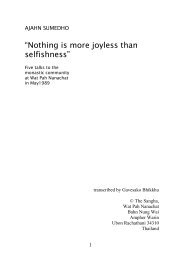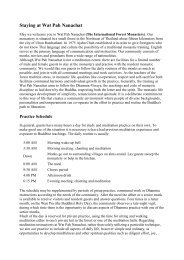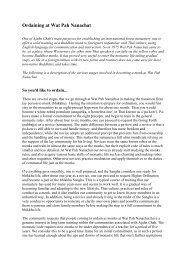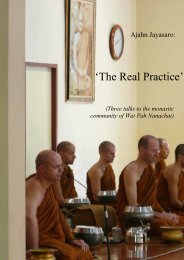Luang Por Liem: The Ways of the Peaceful - Wat Pah Nanachat
Luang Por Liem: The Ways of the Peaceful - Wat Pah Nanachat
Luang Por Liem: The Ways of the Peaceful - Wat Pah Nanachat
Create successful ePaper yourself
Turn your PDF publications into a flip-book with our unique Google optimized e-Paper software.
<strong>The</strong> more we take ourselves as important, <strong>the</strong> more we are<br />
prone to drifting away towards unwholesome feelings, towards<br />
suffering, until we finally follow <strong>the</strong> path into <strong>the</strong> realms <strong>of</strong><br />
darkness. In this way we drift along <strong>the</strong> round <strong>of</strong> birth and<br />
becoming. <strong>The</strong> Buddha saw this as <strong>the</strong> source <strong>of</strong> all suffering.<br />
States <strong>of</strong> anger, greed or delusion come to be. Desire, aversion<br />
and ignorance arise. All <strong>of</strong> <strong>the</strong>se states <strong>of</strong> being entail suffering<br />
and unhappiness.<br />
By analyzing and observing our personality we see that it<br />
consists <strong>of</strong> what is called namadhamma. Mental phenomena are<br />
also not ours, not our self. Our personality is not “we” or “<strong>the</strong>y”,<br />
but simply consists <strong>of</strong> certain combinations <strong>of</strong> all <strong>the</strong> possible<br />
mental states. Don’t see it as “this is me” or “this is mine”. See it<br />
in <strong>the</strong> light <strong>of</strong> mental states which arise naturally on <strong>the</strong>ir own and<br />
<strong>the</strong>n cease on <strong>the</strong>ir own. Just like <strong>the</strong> darkness comes to be<br />
naturally, it goes naturally as well. As brightness is born in its<br />
own natural way, it likewise ceases. <strong>The</strong>se states arise and vanish.<br />
Mental states arise and cease, whe<strong>the</strong>r <strong>the</strong>y are states <strong>of</strong><br />
happiness or suffering, agreeable states (ittharammana) or<br />
disagreeable states (anittharammana). <strong>The</strong>se two are what we<br />
call <strong>the</strong> Wordly Dhammas, attributes that dominate <strong>the</strong> hearts and<br />
minds <strong>of</strong> beings living in <strong>the</strong> world. Seeing <strong>the</strong> Worldly Dhammas<br />
simply as elements <strong>of</strong> nature, we won’t make <strong>the</strong> assumption that<br />
we are happy whenever we feel happiness, or that we are suffering<br />
whenever we feel suffering. <strong>The</strong>re is nothing like our goodness or<br />
our badness ei<strong>the</strong>r. We see <strong>the</strong>se attributes, but <strong>the</strong>y are just<br />
aspects <strong>of</strong> Dhamma. Each being merely one <strong>of</strong> <strong>the</strong> possible states<br />
<strong>of</strong> Dhamma. <strong>The</strong>re is nothing special about it.<br />
124


